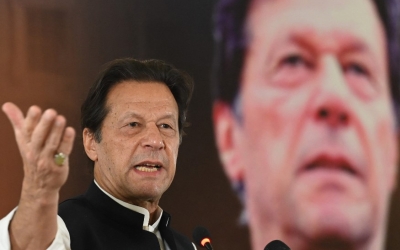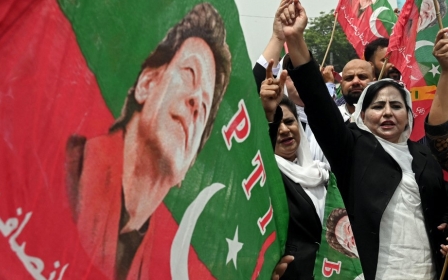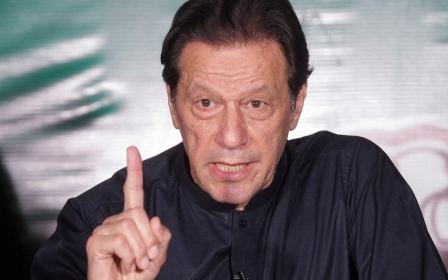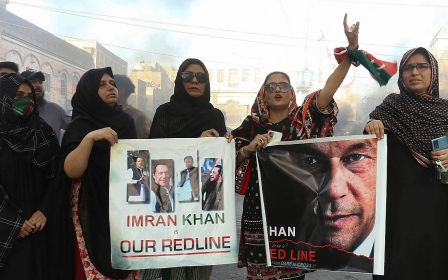Pakistan elections are a sham without Imran Khan
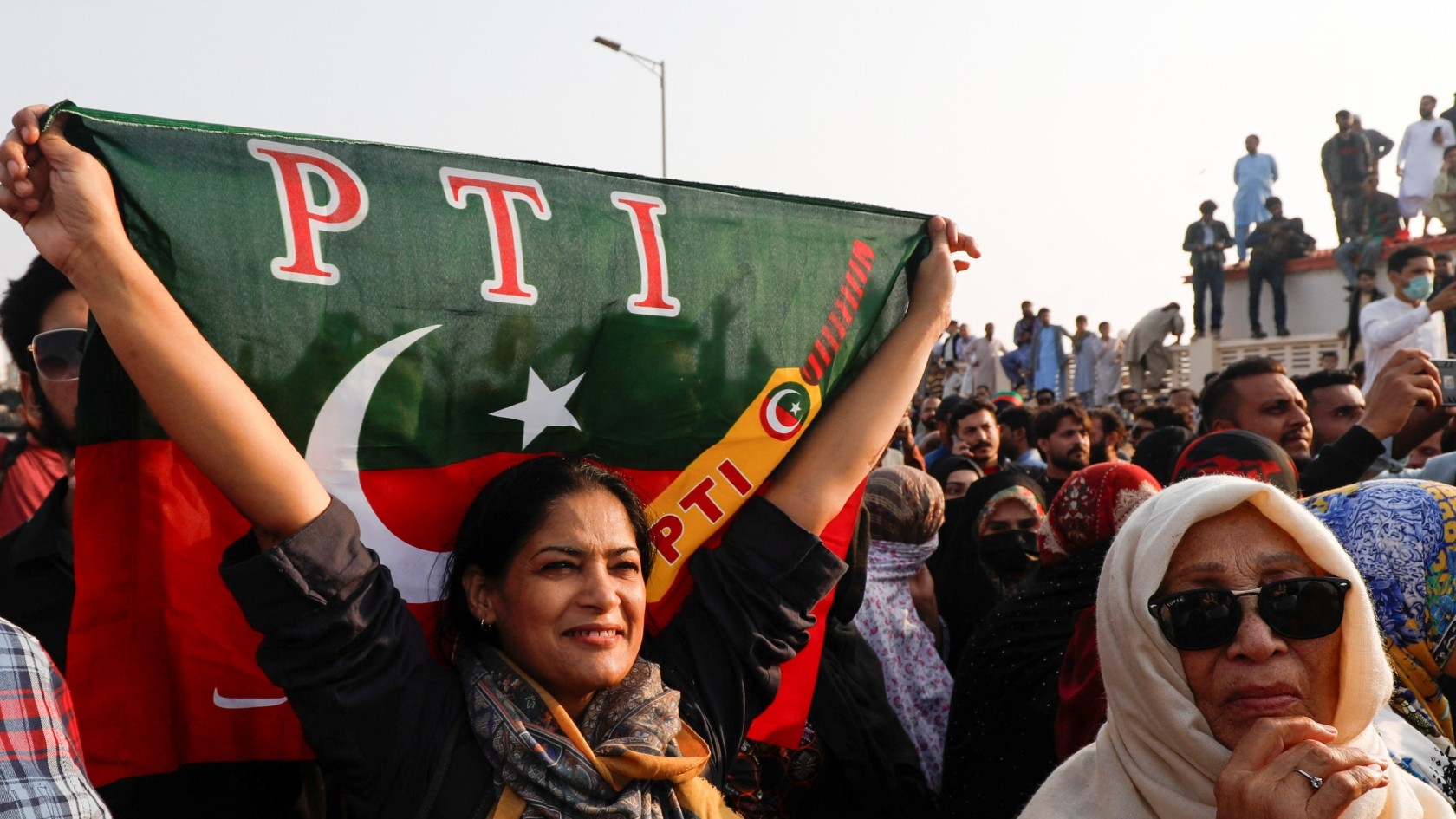
It is election day in Pakistan. But in the world’s fifth largest democracy, people are not able to vote for the most popular leader, former Prime Minister Imran Khan, who cannot contest elections after having been disbarred. Khan will spend today - and potentially 14 more years - in jail. So how did the situation get so bad and what lies ahead?
Khan and his party, Pakistan Tehreek-e-Insaf (PTI), are leading in opinion surveys, but their electoral symbol has been banned, and observers are predicting that the vote will be a fait accompli for former Prime Minister Nawaz Sharif of the Pakistan Muslim League (PML-N).
The sad truth is that Pakistan runs under hybrid rule, where the support or opposition of its generals is more important than what voters want.
Political leaders have fallen out of favour in the past, and some have paid with their lives, while others have taken a backseat until rallying again behind the generals, hoping to get to the throne. Khan took a different route. After being ousted in 2022, he took to the streets, and has since been on the receiving end of the generals’ fury.
Khan has been hit with dozens of charges, from illegal marriage to terrorism. Most crucially, he was charged with contravening the Official Secrets Act over the publication of a confidential diplomatic “cypher” sent by Pakistan’s ambassador to the US in 2022. The cable reportedly indicated that officials in Washington were angling to remove Khan from power.
Stay informed with MEE's newsletters
Sign up to get the latest alerts, insights and analysis, starting with Turkey Unpacked
"This case and charges against me have far-reaching consequences for the future of Pakistan, as if I am sentenced in this case, no prime minister will ever be able to stand against the powerful army chief or the unjust demands of an outside power like the United States," Khan told the trial judge in his 10-page defence statement last week.
As policy analyst Jeffrey Sachs has noted, a “principal instrument of US foreign policy is covert regime change”. The silence of the US, UK and EU on Khan’s case is telling.
Unfair trials
Khan is not getting a fair chance in any of his cases. The rushed trials seem to have predetermined outcomes. In the state secrets case, he was convicted last week alongside the country’s former foreign minister, Shah Mahmood Qureshi, to 10 years in prison.
Also last week, Khan and his wife were sentenced to 14 years in a case that centred on the sale of state gifts. Days later, they were both sentenced to seven years for an “illegal” marriage, marking a new low in Pakistan’s tainted judicial history.
Only time will tell whether Khan can survive this all-out onslaught, and whether he will rise again from his prison cell
All three convictions were secured by depriving Khan of the right to appoint a counsel of his own choice, withholding legal assistance, refusing to allow him to produce any defence witnesses or evidence, and concluding all trials within a week. The three trials were conducted in prison, with limited access to the public and media.
Khan has found himself in this position after inciting the ire of some of Pakistan’s most powerful officials. Given his patriotic (some would say nationalistic) agenda and politics, he still enjoys a lot of support among the army’s rank-and-file - but not among its top tier. Today, he is facing their wrath.
In 2019, Khan removed as intelligence chief General Asim Munir, who is now the army chief. He has also clashed in the past with Qazi Faez Isa, now Pakistan’s chief justice.
Beyond simply refusing to accept his fate at the hands of the army generals, Khan held large-scale political gatherings across the country to expose them. In November 2022, he was the victim of an unsuccessful assassination attempt, for which he blamed state forces. Months later, in May 2023, he was arrested - a development that sparked massive protests, with some demonstrators storming the military’s headquarters.
Crackdown on dissent
Since then, Pakistan has witnessed a terrible time for political dissent. The army has launched a massive crackdown on Khan’s PTI, with leaders picked up on random charges or reported missing. Journalists covering the saga have also disappeared or turned up dead.
There have also been a series of news conferences, wherein PTI leaders have either left politics altogether, often after threats of violence against their close family members, or left the PTI to join another party. Some have even spoken out against Khan and made new alliances. But Khan still stands tall, refusing to back down.
With journalists silenced, Khan banned on television channels, political activists facing military trials, and the PTI being stifled through the banning of its electoral symbol in a questionable court verdict, the odds are against Khan.
Thursday’s elections are already being dubbed as the most rigged in the country’s tainted history. The PTI’s party offices and candidates’ homes have been raided. People have reportedly been assigned polling stations unrelated to their place of residence, and there appear to be faults in the election management system that will collect and tabulate results.
Despite these efforts to keep Khan out, he remains the country’s most popular leader. He will be hoping for a large voter turnout to defy the generals’ tactics.
Only time will tell whether Khan can survive this all-out onslaught, and whether he will rise again from his prison cell. Regardless, the generals have disenfranchised the country’s ever-growing population and compromised all state institutions, especially the judiciary.
Today’s youth must participate in the political process, but if the elections are stolen from them, Pakistan’s hopes for a genuine democracy will yet again be dashed.
The views expressed in this article belong to the author and do not necessarily reflect the editorial policy of Middle East Eye.
Middle East Eye delivers independent and unrivalled coverage and analysis of the Middle East, North Africa and beyond. To learn more about republishing this content and the associated fees, please fill out this form. More about MEE can be found here.



